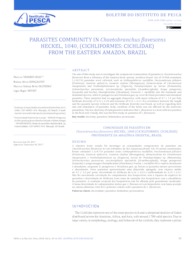Parasites community in Chaetobranchus flavescens Heckel, 1840, (Cichliformes: Cichlidae) from the Eastern Amazon, Brazil.
Parasites community in Chaetobranchus flavescens Heckel, 1840, (Cichliformes: Cichlidae) from the Eastern Amazon, Brazil.
Autoria: TAVARES-DIAS, M.; GONÇALVES, R. A.; OLIVEIRA, M. S. B.; NEVES, L. R.
Resumo: The aim of this study was to investigate the component communities of parasites in Chaetobranchus flavescens from a tributary of the Amazon River system, northern Brazil. Out of 39 fish examined, 1,124,710 parasites were collected, such as Ichthyophthirius multifiliis, Piscinoodinium pillulare (Protozoa), Gussevia spilocirra, Gussevia elephus (Monogenea), metacercariae of Clinostomum marginatum and Posthodiplostomum sp. (Digenea), Pseudoproleptus sp. larvae. (Nematoda), Echinorhynchus paranensis, Gorytocephalus spectabilis (Acanthocephala), Braga patagonica (Isopoda) and leeches Glossiphonidae (Hirudinea). However, I. multifiliis was the dominant and abundant species, while B. patagonica and Hirudinea gen. sp. were the least prevalent and abundant parasites. These parasites had an aggregate dispersion, with mean richness of 4.7 ± 1.5 per fish, Brillouin diversity of 0.32 ± 0.29 and evenness of 0.15 ± 0.13. No correlation between the length and the parasite species richness and the Brillouin diversity was found, as well as regarding host size and abundance of parasites. Body condition of the hosts was not affected by the moderate parasitism. The low diversity of endoparasites indicates that C. flavescens is a host with low position in the food web. Finally, this was the first study on parasites of C. flavescens.
Ano de publicação: 2018
Tipo de publicação: Artigo de periódico
Unidade: Embrapa Amapa
Palavras-chave: Diversidade, Diversity, Helminthe, Helminto, Protozoan, Protozoário
Observações
1 - Por padrão são exibidas publicações dos últimos 20 anos. Para encontrar publicações mais antigas, configure o filtro ano de publicação, colocando o ano a partir do qual você deseja encontrar publicações. O filtro está na coluna da esquerda na busca acima.
2 - Para ler algumas publicações da Embrapa (apenas as que estão em formato ePub), é necessário ter, no celular ou computador, um desses softwares gratuitos. Sistemas Android: Google Play Livros; IOS: iBooks; Windows e Linux: software Calibre.
Acesse outras publicações
Acesse a Base de Dados da Pesquisa Agropecuária (BDPA) para consultar o acervo completo das bibliotecas da Embrapa.

